Russia is the Aggressor.’ Ukraine Creates New Legal Framework with Donbas Reintegration Laws

Olexiy Haran Speaks to Marta Dyczok and Explains the New Donbas Reintegration Laws
 Dyczok: Last week a bill on reintegration of Donbas was passed by the Ukrainian Parliament. It was full of drama, scuffles, and even a smoke bomb. To help us understand what it was all about is one of Ukraine’s top analysts Olexiy Haran. He is Professor of Political Science at the National University of the Kyiv-Mohyla Academy, Research Director of the Democratic Initiatives Foundation, a regular commentator on Ukraine Calling. And he has travelled regularly to Ukraine’s war zone. Professor Haran, thank you very much again for finding the time to speak to us. Let’s start with the timing of this Bill. I follow Ukraine’s politics pretty carefully and yet, perhaps I was not paying close enough attention, what is the timing of this Bill? It seems that it have appeared just of left field. Can you explain why the Bill was adopted last week?
Dyczok: Last week a bill on reintegration of Donbas was passed by the Ukrainian Parliament. It was full of drama, scuffles, and even a smoke bomb. To help us understand what it was all about is one of Ukraine’s top analysts Olexiy Haran. He is Professor of Political Science at the National University of the Kyiv-Mohyla Academy, Research Director of the Democratic Initiatives Foundation, a regular commentator on Ukraine Calling. And he has travelled regularly to Ukraine’s war zone. Professor Haran, thank you very much again for finding the time to speak to us. Let’s start with the timing of this Bill. I follow Ukraine’s politics pretty carefully and yet, perhaps I was not paying close enough attention, what is the timing of this Bill? It seems that it have appeared just of left field. Can you explain why the Bill was adopted last week?
Haran: The timing is actually was one of the main arguments for President to adopt this law quickly. Why? We should go back to the fall of 2014, after the aggression of Russian regular troops (in the Donbas) and the first Minsk Agreements. The main thing (goal) was to stop the fighting, and to have a cease fire agreement. In order to reach these, there were some compromised concessions from, I would say, the Ukrainian side. Because at that time Ukraine had to adopt a law on so-called special modus vivendi of self-government in some areas of Donetsk and Luhansk regions, specifically areas which were occupied by Russia and pro-Russian proxies. Ukrainian parliamentary deputies and the Ukrainian population did not want to adopt this law, to give a special status, a kind of autonomy, which Russia demanded for the occupied territories. But Ukraine adopted this Law and it became one of the signs, tools of president Poroshenko, to show that Ukraine is ready for concessions. However, the Law should come into force upon important conditions, that Russian troops should be withdrawn from Ukraine, and free elections will be held in these areas. It was adopted in the fall of 2014. The period of functioning of this Law was three years.
Dyczok: That is why the timing of three years. OK.
Haran: There were no free elections because Russian troops did not leave Ukraine. We had this Law, it was adopted but it did not come into force. And it was for three years. Basically, on October 18 (2017) it will expire. The question is what would happen next. It’s a diplomatic game, because both Ukraine and our Western partners understand that Russian is not going to implement the Minsk Agreements. For us the most important part is security part. Russia does not want to do it. But we need some signals that Ukraine is ready to implement and Russia is undermining those agreements. It was suggested by our Western partners, which was agreed with President Poroshenko, to continue this Law for one more year. By doing this, it will show that Ukraine is ready to implement the agreements, and who is undermining them: Russia. And for Western leaders this would add additional arguments to persuade their own parliaments, their own public opinion, that the sanctions against Russia should continue.
It’s quite a complicated diplomatic game. Therefore President Poroshenko introduced two bills to the Ukrainian Parliament. One was general Ukrainian policy towards occupied areas. The second law was actually very short, two paragraphs, about the continuation of this law on the special mode for self-government in these areas. There was a debate, because frankly speaking, for us, for Ukrainians, it’s very unpleasant even to talk about some things that pro-Russian proxies should receive. Receive for what? Some kind of autonomy. When Russian soldiers are on Ukrainian territory. That is why politically it is a very sensitive issue for Ukrainians. And Ukrainian opposition (parties) also try to use this in their campaign against President Poroshenko, and against the government. That is why there was a very dramatic discussion. And finally this law was adopted. However, what is interesting is that in the final text of this law there is no reference to the Minsk Agreements, because Ukrainian MPs did not want to even show that the Minsk Agreements are part of domestic Ukrainian legislation. But basically the law implements some provisions of the Minsk Agreements.
Dyczok: Sorry, there are two laws you’ve mentioned. One is on the Reintegration of Donbas, and the other is the Creating of Necessary Conditions for Peaceful Resolution. So which one is the more important? Are they both important? Because my understanding is that the second one, on ‘Creating Necessary Conditions for Peaceful Resolution,’ was adopted. The controversial one was on the Reintegration of Donbas. Is that correct?
Haran: No, both actually were controversial. The second one, the small one..
Dyczok: Which one is the small one?
Haran: On Creating the Necessary Conditions [for Peaceful Resolution]. It’s two paragraphs (long). It continues…
Dyczok: This one is the continuation of the bill from 2014?
Haran: Correct. So again this law [on Creating Necessary Conditions for Peaceful Resolution] is now adopted. The first one has passed the first reading, but is still moving to the second one. Again, this is quite complicated, but Ukraine fulfilled the promise that we are going to give some possibilities for the occupied area, some specifics of self-government, but only if Russian troops withdraw from Ukrainian territory. So what does this mean practically? When we are discussing this law we should understand that in reality we don’t expect that during the next year something serious will change the Russian position. So basically it would mean that this law will not come into force. But this will give more arguments for Ukraine and for our international partners to continue pressure on Russia. So this law was adopted and now we may go to the first law, which is more elaborate and which is talking about other things.
Dyczok: So the short law has been adopted. The longer one, on the Reintegration of Donbas, that’s only gone through the first reading. What are the key points in the second bill about reintegration of Donbas? Russia is named as the aggressor but what else is in that bigger law on the reintegration?
Haran: So basically this law was demanded by Ukrainian society, by experts, and by political opposition to President Poroshenko for a long time, to call officially, and legally, Russia as the aggressor. Poroshenko hesitated, but in his public speeches when he was talking about the war he called Russia the aggressor. And there was even a declaration from the side of the Ukrainian Parliament calling Russia to be an aggressor. But there was no law that was adopted by Ukrainian parliament. The reason for that [Poroshenko’s hesitation], I believe, was partly pressure from our international partners. Because they were afraid to call Russia the aggressor, because it would complicate the situation in negotiations with Russia, talks within the Normandy format, and the Minsk process. Basically this was their view. So that’s why President Poroshenko hesitated to introduce such a law to the Rada (Parliament). And it didn’t benefit his ratings, because the political opposition used it to the full extent. So actually the time was ripe long ago to introduce this law, to call Russia the aggressor, and to recognize that these territories where there are Russian troops and which Ukraine doesn’t control are temporarily occupied territories. So this is very important. So finally we fix the state in legal terms.
Dyczok: But what else is in the law? This is important to the declaration but what substantively does this law do? What is it supposed to accomplish other than recognizing or stating officially that Russia is the aggressor?
Haran: It’s not only a declaration because now it creates legal possibilities. It says that Ukraine, and not Russia the aggressor, is responsible for these territories. So we may apply to international courts because, Russia considers that Ukraine is not controlling these areas and that Russia is responsible for them. So we may sue Russian government. What else is important is that officially what is happening in the east of the country was previously called, by the Ukrainian side, “anti-terrorist operations.” And it was anti-terrorist operations. Until Russian regular troops invaded Ukraine in late August 2014. After that it became a military conflict. It wasn’t just anti-terrorist operations, it was full-scale military conflict between Ukraine and Russia with tanks, artillery, multiple rocket systems, and so on and so forth. So what is in this law? The law recognizes that we have not an anti-terrorist operation but that we have Russian military aggression. So it creates a new legal framework for the army because now all the legal norms and rules would be applied to this situation. This is very important for the army.
Dyczok: Can you give us some details? What sort of changes will be possible now? What do these new norms allow the army to do that it previously wasn’t?
Haran: It means that on the front line basically the full control will rest with the army. Because previously the anti-terrorist operation was headed by the Security Services of Ukraine. So now it’s under control of the army, and it reflects the situation. It relies on military norms not just norms of normal life. So this is important. It creates the chain of commanders, which de facto had existed, but there were not enough justifications by legal instruments for that. Now those instruments are in place.
Dyczok: Has there been any international reaction to these new pieces of legislation by Ukraine?
Haran: The reaction from our international partners is positive, and that’s what Ukraine expected. As I have explained to you, it helps Ukraine to continue working with the international coalition, which imposed sanctions of Russia and not to be fooled by Russian propaganda that this is a kind of civil conflict in the east of Ukraine. No, it’s not a civil conflict, it’s Russian aggression. And because Ukraine nevertheless introduced some compromise approach that corresponds to Minsk Agreements, it gives arguments for our international partners to say, “Ukraine is ready to move forward and Russia is not.” So the reaction from our Western partners is positive. Russia definitely said that this is a sign from Ukraine that Ukraine is not going to solve the conflict, but this is not the case.
Dyczok: Some commentators in Ukraine have said that this law is unlikely to have much of an impact. Would you agree? Will it be implemented? Will these new legislations have an impact on what’s going on in the Donbas?
Haran: Look, in the end of the day what will happen in Donbas is definitely defined not by laws but by the real correlation of forces in international politics, in situation in Ukraine and Russia. However, as I have said, these are important things. So, first of all, these laws give legal arguments for Ukraine to sue Russia in international organizations and international courts. It creates necessary legal framework for Ukrainian army to conduct the military operation, and finally it helps to cement sanctions against Russia. So, this is part within the diplomatic offensive in order to stop Russian aggression and to make Russian troops to withdraw from Ukraine. There are different fronts in this war. There is a real front in the Eastern Ukraine. There is informational front against Russian propaganda. There is international front with sanctions, with discussion about peacekeepers, which could be sent to the area. So, there is a fight on all these fronts and in this sense these laws are helpful, although the laws in itself they will not solve the conflict.
Dyczok: And of course there is the domestic front. There was quite a lot of opposition, from what I gathered, to this new legislation in Parliament. The bill on the reintegration of the Donbas still has to go through a second reading before it is formally adopted. What are the chances that it will? Can you look forward when is this supposed to go to a second reading? Will it be adopted?
Haran: According to procedure and here there is no such a rush as with the law which continued the mode for self-government for one year. So, according to Parliamentary procedure, there are two weeks for introducing changes, for discussion within the Parliamentary committees, and then there is a possibility to approve it in the second reading. The opposition parties have some suggestions. They are criticizing the approach of President Poroshenko and the governmental coalition, and I believe that the actually some things (amendments) could be introduced. For example, they said that it is important to introduce the date when Russian aggression started. OK, it is important to cover (delineate) the area, the geographic area, which is not controlled by Ukraine in this law. It is important also to mention Crimea. Because Crimea is also under occupation in order to somehow to connect at least symbolically Crimea and…
Dyczok: To make it more comprehensive and reflective of reality.
Haran: To show that we are not going to bargain Donbas for Crimea and vice versa. There is a criticism that Poroshenko would like to concentrate more power in the hands of the army. There are some misreadings in the text. So, actually I believe that some things could be taken into consideration and changed. So, I think actually from Ukrainian government and President it should be wise to take some suggestions from the opposition to the text of the bill, like what happened with the mention of the Minsk Agreements. It was omitted. Okay, it was omitted upon suggestion of opposition, upon suggestion of Poroshenko’s ally in the Parliament, the Peoples’ Front. So, and it is fine. I think some could be introduced. The main thing is that the opposition in Ukrainian Parliament, they would like actually to show that they are more patriotic then Poroshenko. Again, this is part of pre-electoral game, because actually next year there would be a start of presidential campaign, which is supposed to be in 2019, actually that will be in 2019. Then we will have the parliamentary campaigns. So, parts of opposition would like to build their campaign on the criticism of Poroshenko. And they have some grounds, not only in domestic politics, in regarding economic situation, but they would like also demonstrate that they are patriotic and President Poroshenko is not. So, I expect harsh discussions, but from what I see, there should be enough votes to have this law pass the second reading as well.
Dyczok: Thank you very much! So, we will be watching carefully in next two weeks to see which amendments are adopted and whether this law passes its second reading. We have been speaking with Professor Olexiy Haran. I am Marta Dyczok for Hromadske Radio. Thanks for listening!








